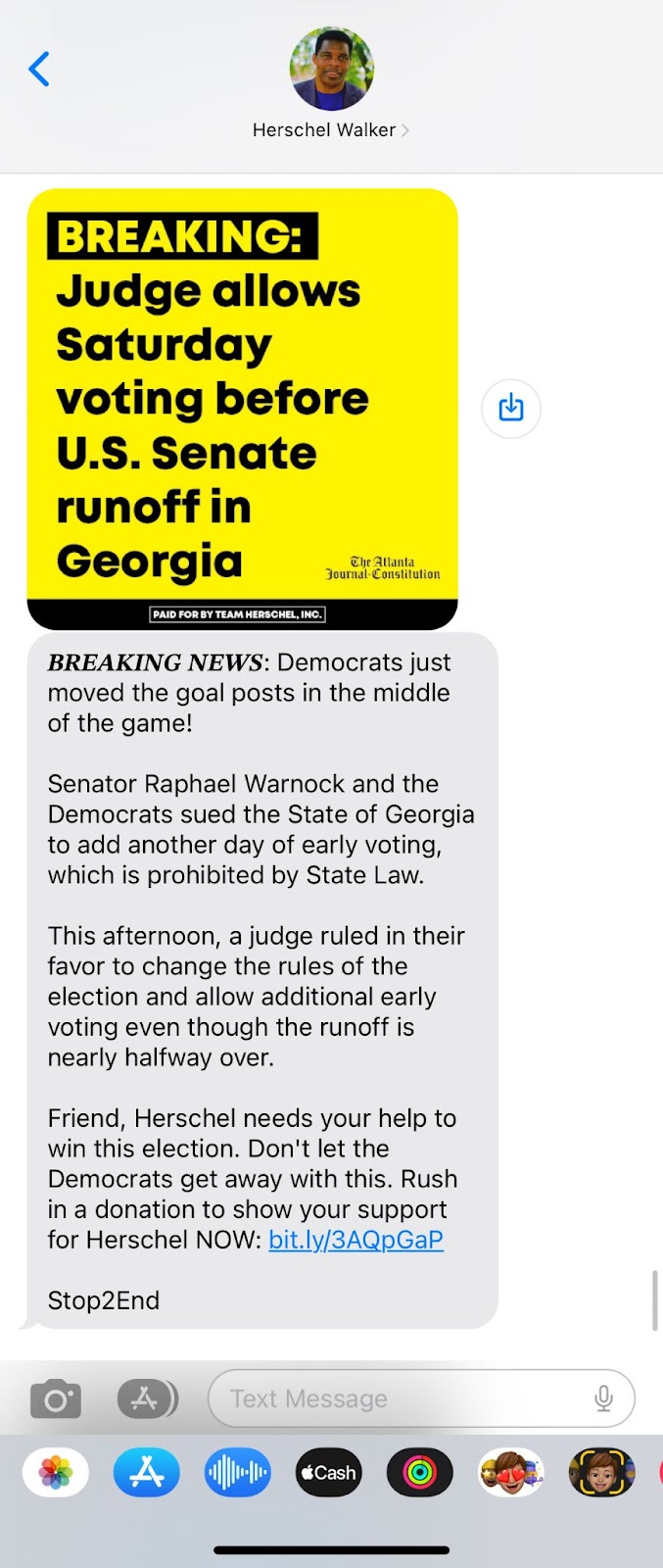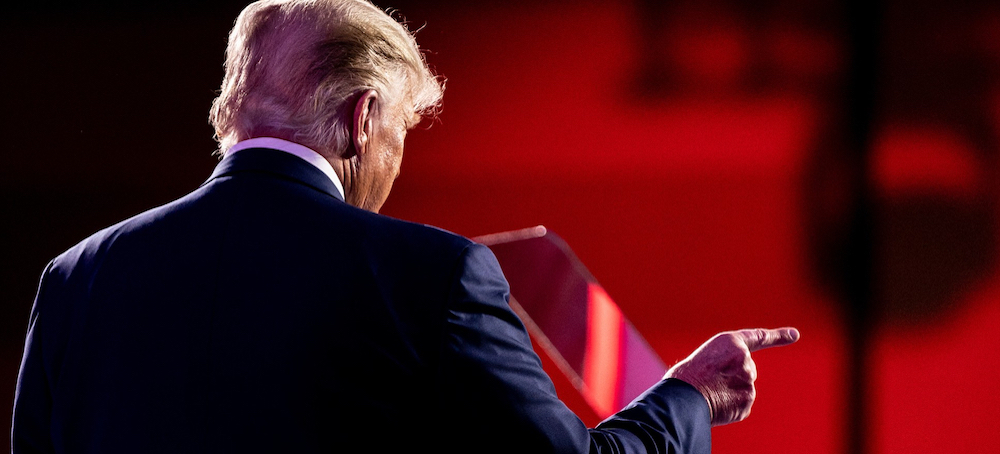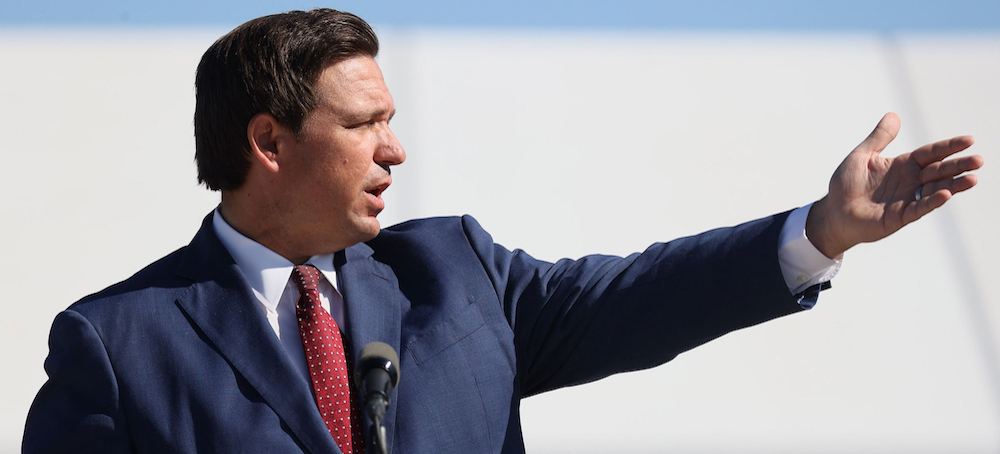It’s Quentin – Reverend Warnock’s campaign manager.
Look, I know what you’re thinking: “Why are you signed up to get texts from Walker’s campaign, Quentin?”
Well this text message above is EXACTLY why! | ||||
Let me explain: Friday a Georgia judge ruled in favor of letting counties offer more early voting opportunities in this runoff election (after Republicans slashed early voting in their 2021 SB202 law). Hours after that ruling, Herschel Walker sent this text trying to raise money off expanded voting hours, and falsely saying it’s against the law.
This is a thinly-veiled admission from Herschel Walker and his team that they want more barriers between voters and the polls. I’ve worked on campaigns for a long time now, and I've seen my fair share of nonsense from Republicans, but it still never ceases to amaze me when they admit to favoring voter suppression in writing.
This is Herschel Walker ADMITTING he knows that the more people who vote on or before December 6th, the more likely he is to LOSE.
With runoff election day around the corner, we need to raise the resources now to turn out every single voter we can reach to help us get across the finish line.
|
UNDER CONSTRUCTION - MOVED TO MIDDLEBORO REVIEW AND SO ON https://middlebororeviewandsoon.blogspot.com/
Sunday, November 20, 2022
Look at this text I got from the Walker campaign
FOCUS: David Rohde | Will the New Special Counsel Bring Donald Trump to Justice?
Live on the homepage now!
Reader Supported News
The task for Merrick Garland—and now Jack Smith—is to ignore political considerations and resolve the investigations as speedily and equitably as possible.
Standing before a row of American and Justice Department flags, Garland read prepared remarks in his signature humdrum monotone. Flanked by three senior Justice Department officials, he said, “The Department of Justice has long recognized that in certain extraordinary cases it is in the public interest to appoint a special prosecutor to independently manage an investigation and prosecution.”
Garland, a former federal judge who still speaks and acts like one, was referring to past criminal inquiries—the Teapot Dome scandal, Watergate—for which the department appointed independent prosecutors to oversee cases against political figures. The goal, theoretically, is to reassure the public that prosecutions—or the lack thereof—do not hinge on the political beliefs or connections of the person under scrutiny. The aim is to uphold a four-word ideal, dating back to Athenian democracy, engraved on courthouses across the United States: “Equal Justice Under Law.”
In this case, the circumstances are extraordinary. Trump, whose supporters, at his urging, stormed the Capitol to prevent Joe Biden from taking power, announced last week that he would be running again for President. And Biden has indicated that he, too, plans to run. Appointing a special counsel, Garland argued, “underscores the department’s commitment to both independence and accountability in particularly sensitive matters.” He’s understating. To have the current President’s appointees criminally prosecuting the former President while they both run for the Oval Office is unprecedented. No such moment has existed before in U.S. history.
The announcement was the latest volley in a high-stakes struggle between Garland and Trump. It began when the Attorney General sent F.B.I. agents to retrieve hundreds of classified documents from Mar-a-Lago. Trump responded by comparing the Justice Department to the Gestapo. The Justice Department then made public the search warrant detailing the scores of top-secret documents that Trump had been hoarding. As Trump paints Garland—and anyone else who challenges him—as part of a corrupt Washington cabal, silence is not an option. Garland is trying to convince Americans that the judicial system is a place where fact, probity, and, most of all, nonpartisan public service still exist.
Smith, Garland’s appointee for special counsel, is now a part of that effort. “Throughout his career, Jack Smith has built a reputation as an impartial and determined prosecutor, who leads teams with energy and focus to follow the facts wherever they lead,” Garland said. A former federal prosecutor who has worked with Smith told me that she agreed, praising Smith for his professionalism and neutrality. “He’s great,” she said.
A graduate of the State University of New York at Oneonta and Harvard Law School, Smith has never before been appointed to office by any political official. After working as a federal prosecutor in Brooklyn and Long Island, he headed the Justice Department’s office of public integrity, which prosecuted Republican and Democratic officials, including the former Democratic senator and Vice-Presidential nominee John Edwards for violating campaign-finance laws. (Edwards was acquitted.) Smith currently works as the chief prosecutor of a special court based in The Hague that investigates war crimes in Kosovo.
Immediately after Garland’s announcement, Trump went on the attack. At a dinner event at Mar-a-Lago, he said, “The corrupt and highly political Justice Department just appointed a super-radical-left, super-special counsel.” He dismissed the ongoing investigations as part of the “never-ending witch hunt” and, true to form, pointed a finger elsewhere. “If they are going to investigate me, they have to investigate all of these other Presidents—and they have to start it right now,” he said, claiming that Bill Clinton, George H. W. Bush, George W. Bush, Barack Obama, and Joe Biden should all be prosecuted. “We’re living in a very corrupt country right now—never had anything like it,” he said. “Our elections are rigged, tainted, and bad.”
Some former prosecutors criticized Garland’s appointment of Smith, warning that it would delay the Trump investigations and potentially allow him to campaign for President without being held accountable. It could also establish a precedent that anyone under investigation who declares that they are running for political office merits the appointment of a special counsel to their case. Others disagreed, saying that Smith’s appointment would speed up the investigation because he will be unhindered by Justice Department bureaucracy.
In an interview last year, the Democratic congressman Jamie Raskin, a longtime opponent of Trump’s, told me, “We need to win this struggle politically.” For Democrats, last week’s midterm elections, in which many Trump-endorsed candidates lost their races, again demonstrated that defeating Trump at the ballot box is possible without a criminal indictment. Two impeachments and multiple probes of his business practices have suggested that exposing wrongdoing by Trump isn’t enough alone to politically discredit him. And as my colleague Amy Davidson Sorkin has noted, even if Trump were convicted, he would still be able to run for President.
Ilya Somin, a law professor at George Mason University, told me that Garland’s painstaking efforts to show that the Justice Department is politically neutral are unlikely to sway the views of Trump supporters in an era of deep political polarization. But those efforts could influence independents and moderates who declined to support Trump-backed election deniers in the midterms. Garland’s—and now Smith’s—task will be to ignore political considerations and resolve the investigations as speedily and equitably as possible. Whether the appointment of a special counsel, or a potential criminal trial, undermines or aids Trump may not be known until the 2024 Republican Presidential primaries. “It partly comes down to issues that have nothing to do with Garland,” Somin said. “It could come down to how much momentum [Ron] DeSantis or another Republican candidate generates against Trump.” Wall-to-wall press coverage of a Trump trial could be the best thing to happen to his campaign.
Follow us on facebook and twitter!
PO Box 2043 / Citrus Heights, CA 95611
RSN: Bess Levin | Federal Judge Tells Ron Desantis to Sit Down And STFU
Live on the homepage now!
Reader Supported News
The judge blocked Florida from enforcing its anti-free speech law restricting conversations about race, calling it “positively dystopian.”
In a 138-page order, chief US district judge Mark Walker blocked state officials from enforcing a central piece of the Stop WOKE Act, which he dubbed “positively dystopian” and says violates the First Amendment. Citing George Orwell’s 1984, Walker wrote that DeSantis and company seem to believe that “the State has unfettered authority to muzzle its professors in the name of ‘freedom,’” which is quite obviously not freedom at all. Zeroing in on the fact that the law targets freedom of expression that DeSantis and his fellow Republicans don’t like, Walker wrote: “The law officially bans professors from expressing disfavored viewpoints in university classrooms while permitting unfettered expression of the opposite viewpoints. Defendants argue that, under this Act, professors enjoy ‘academic freedom’ so long as they express only those viewpoints of which the State approves.”
The law had created absurd new protections for students and workers that would allow them to sue if they believe a classroom lesson or workplace training course caused them to “feel guilt, anguish, or any other form of psychological distress” due to their race. While the bill never uses the phrase “white people,” it was quite clearly drafted with their fragility in mind, and if you want to know how we knows this, Exhibit A would be DeSantis’s recent claim that it’s wrong to teach students that America “was built on stolen land,” which the governor declared at a debate last month isn’t true. We’ll give you two guesses as to which group of people benefit from that lie, but if you’re in anyway familiar with US history, you’ll only need one.
Walker’s ruling stemmed from two separate challenges to the law. One of them was filed by the Foundation for Individual Rights and Expression, which argued that the legislation could restrict teaching about people like Jackie Robinson, and how he broke race barriers to become the first Black baseball player in Major League Baseball in the modern era. The other suit, filed by the ACLU, the ACLU of Florida, and the Legal Defense Fund called the legislation a “discriminatory classroom censorship law that severely restricts” how race and gender can be discussed in schools.
“This is a huge victory for everyone who values academic freedom and recognizes the value of inclusive education,” said Emerson Sykes, a senior staff attorney with the ACLU Speech, Privacy, and Technology Project, in a statement. “The First Amendment broadly protects our right to share information and ideas, and this includes educators’ and students’ right to learn, discuss, and debate systemic racism and sexism.”
A spokesperson for the governor has, unsurprisingly, said the administration will appeal.
READ MORE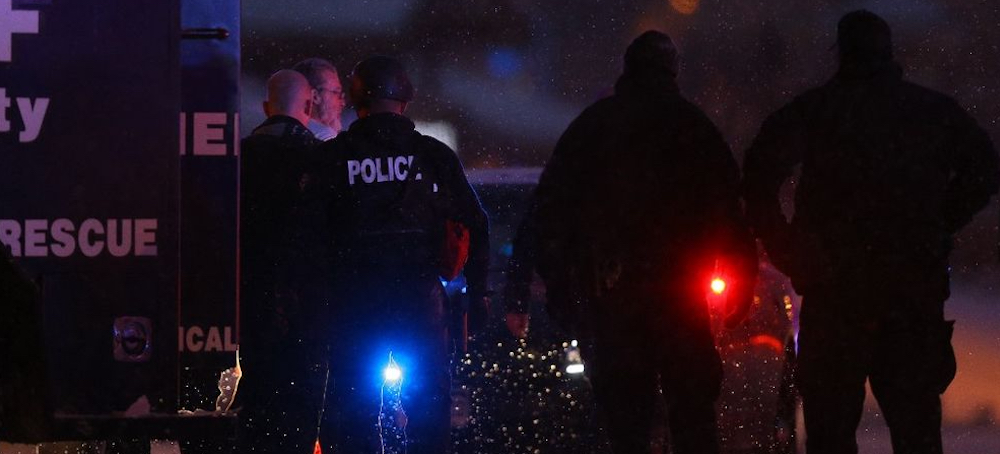 Police officers in Colorado Springs, Colorado. (photo: Justin Edmonds/Getty Images/AFP)
Police officers in Colorado Springs, Colorado. (photo: Justin Edmonds/Getty Images/AFP)
Lt. Pamela Castro of the Colorado Springs Police Department said police received a report of a shooting at Club Q at 11:57 p.m.
Castro said there was one suspect who was injured and was being treated. She said it was not immediately clear whether he had been shot by officers. She said the FBI was on the scene and assisting in the case.
Club Q is a gay and lesbian nightclub that features a “Drag Diva Drag Show” on Saturdays, according to its website.
“Club Q is devastated by the senseless attack on our community,” the club posted on its Facebook page. It said its prayers were with victims and families, and “We thank the quick reactions of heroic customers that subdued the gunman and ended this hate attack.”
Colorado Springs is a city of about 480,000 located about 70 miles south of Denver that is home to the U.S. Air Force Academy. The city has long been an epicenter of American evangelicalism. Focus on the Family, a prominent evangelical Christian ministry, is based in Colorado Springs.
In November 2015, three people were killed and eight wounded at a Planned Parenthood clinic in the city when authorities say a man opened fire because he wanted to wage “war” on the clinic because it performed abortions.
The motive behind Saturday’s shooting was not immediately known but it brought back memories of the 2016 massacre at the the Pulse nightclub in Orlando, Florida, that killed 49 people. And it occurred in a state that has experienced several notorious mass killings, including at Columbine High School, a movie theater in a Denver suburb in 2012 and a Boulder supermarket last year.
In June, 31 members of the neo-Nazi group Patriot Front were arrested in Coeur d’Alene, Idaho, and charged with conspiracy to riot at a Pride event. Experts warned that extremist groups could see anti-gay rhetoric as a call to action.
The previous month, a fundamentalist Idaho pastor told his small Boise congregation that gay, lesbian and transgender people should be executed by the government, which lined up with similar sermons from a Texas fundamentalist pastor.
There have been 523 mass killings since 2006 resulting in 2,727 deaths as of Nov. 19, according to The Associated Press/USA Today database on mass killings in the U.S.
READ MORE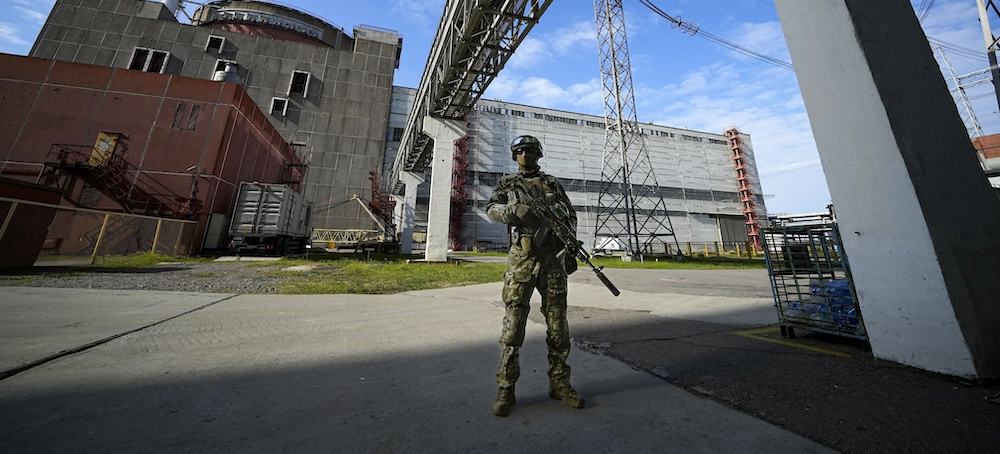 A Russian soldier stands in front of the Zaporizhzhia Nuclear Power Station in territory under Russian military control. (photo: AP)
A Russian soldier stands in front of the Zaporizhzhia Nuclear Power Station in territory under Russian military control. (photo: AP)
More than a dozen blasts shook Europe's biggest nuclear power plant on Saturday evening and Sunday, the International Atomic Energy Agency (IAEA) said. Moscow and Kyiv both blamed the other for the shelling of the facility.
"The news from our team yesterday and this morning is extremely disturbing," said Rafael Grossi, head of the IAEA, whose team on the ground said there had been damage to some buildings, systems and equipment at the plant.
"Explosions occurred at the site of this major nuclear power plant, which is completely unacceptable. Whoever is behind this, it must stop immediately. As I have said many times before, you're playing with fire!"
Repeated shelling of the plant in southern Ukraine, which Russia took control of shortly after its February invasion, has raised concern about the potential for a grave accident just 500 km (300 miles) from the site of the world's worst nuclear accident, the 1986 Chornobyl disaster.
The Zaporizhzhia nuclear power plant provided about a fifth of Ukraine's electricity before Russia's Feb. 24 invasion, and has been forced to operate on back-up generators a number of times. It has six Soviet-designed VVER-1000 V-320 water-cooled and water-moderated reactors containing Uranium 235.
The reactors are shut down but there is a risk that nuclear fuel could overheat if the power that drives the cooling systems was cut. Shelling has repeatedly cut power lines.
SIDES SWAP BLAME
Both Kyiv and Moscow have accused each other of attacking the plant on several occasions during the conflict and risking a nuclear accident, and they again exchanged blame on Sunday.
Russia's defence ministry said Ukraine fired shells at power lines supplying the plant, while TASS reported some of the site's storage facilities had been hit by Ukrainian shelling, quoting an official from Russian nuclear power operator Rosenergoatom.
"They shelled not only yesterday, but also today, they are shelling right now," said Renat Karchaa, an adviser to Rosenergoatom's CEO, adding that any artillery attack at the site posed a threat to nuclear safety.
Karchaa said the shells had been fired near a dry nuclear waste storage facility and a building that houses fresh spent nuclear fuel, but that no radioactive emissions had currently been detected, according to TASS.
Ukraine's nuclear energy firm Energoatom accused the Russian military of shelling the site and said there were at least 12 hits on plant infrastructure.
It said that Russia had targeted the infrastructure necessary to restart parts of the plant in an attempt to further limit Ukraine's power supply.
READ MORE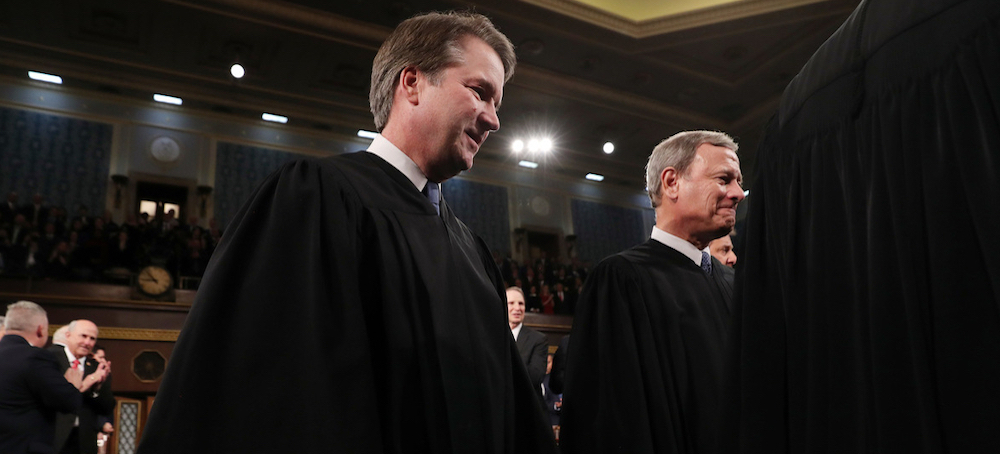 Justice Brett Kavanaugh and Chief Justice John Roberts. (photo: Getty Images)
Justice Brett Kavanaugh and Chief Justice John Roberts. (photo: Getty Images)
Scheduled for argument next month, Moore v. Harper concerns the ability of state courts to enforce state constitutions and state laws in elections. The case arises from partisan gerrymandering of congressional districts in North Carolina, a purple state that went for Obama in 2008 and for Republican presidential candidates since then, but always by narrow margins. Donald Trump carried the state by 1.3 percentage points in 2020.
After Republicans gained control of the North Carolina legislature in the middle of the last decade, they redrew congressional districts in the state. Leaders of the effort said their goal was to give Republicans control of 10 of the state’s 13 congressional seats.
A computer drew 3,000 possible maps, and Republicans chose the one most likely to benefit their party. It succeeded: In 2018, Republican and Democratic candidates for Congress got similar numbers of votes in the state, but Republicans won 10 of 13 races.
A challenge to the redistricting went to the U.S. Supreme Court, but the justices, in a 5-4 decision in 2019, held that federal courts may not hear challenges to partisan gerrymandering. The court found that such cases are political questions that may not be adjudicated by the federal judiciary. The justices expressly left it to state courts to find whether partisan gerrymandering violates state constitutions.
After the 2020 census, North Carolina and other states redrew their election districts. There are now 14 congressional seats in the state, and the legislature drew the districts so that Republicans would be likely to win 10 or 11 of them. The North Carolina Supreme Court found that in violation of the state constitution and appointed a commission to redraw the districts.
The legislature and its supporters appealed to the U.S. Supreme Court, contending that the North Carolina Supreme Court had no legal authority to get involved — that the state legislature had the last, unreviewable word. The appellants based their argument on a provision of Section 4 of Article I of the U.S. Constitution, which says that the legislature of each state shall determine the time, place and manner of congressional elections. The “independent state legislature theory” interprets this literally to mean that a legislature’s decisions about elections are not subject to court review.
There are many problems with this theory. It has always been understood that courts can review legislative actions to ensure their compliance with the law. Article I of the Constitution grants Congress many powers, but the courts always get to decide whether an act of Congress violates the Constitution.
If the Supreme Court were to accept the independent state legislature theory, it would seem that no court could ever review laws regulating elections for Congress, no matter how egregiously unconstitutional. It would mean, for example, that no court could review partisan gerrymandering, no matter how extreme.
But the implications of the independent state legislature theory go beyond that. There is another provision of the Constitution, in Section 1 of Article II, that gives legislatures the power to allocate each state’s presidential electors, which could have serious implications for the next election.
Imagine if the 2024 presidential election is as close as the 2020 election. Imagine if the Democratic candidate wins the popular vote in states with Republican legislatures, as happened in several states two years ago. Imagine if several of these legislatures nevertheless award their electoral votes to the Republican candidate, notwithstanding a state law that requires the winner of the popular vote to receive the electoral votes. Donald Trump and his supporters urged several state legislatures to do exactly that in 2020, though none ultimately did.
If the court accepts the independent state legislature theory, it could empower states to do that in 2024. If even a few states do, it could decide the presidential election. I do not believe American democracy would survive that. The country could come apart, with secession movements taking hold in many states.
Judicial review of legislative acts has been a central feature of American government since Marbury v. Madison was decided in 1803. I hope the Supreme Court will protect judicial power and see the enormous threat this theory poses to democracy. But I am very worried.
Erwin Chemerinsky is the dean and a professor at the UC Berkeley School of Law.
READ MORE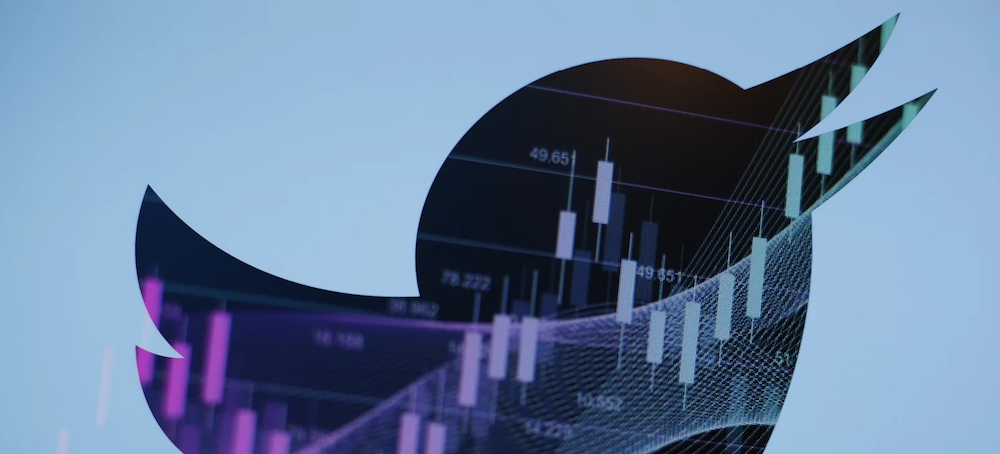 The departures of thousands of Twitter workers is raising fears about the stability of the influential social media site under new owner Elon Musk. (image: NurPhoto/Getty Images)
The departures of thousands of Twitter workers is raising fears about the stability of the influential social media site under new owner Elon Musk. (image: NurPhoto/Getty Images)
ALSO SEE: Musk Restores Trump’s Twitter Account
That Was Suspended After January 6
While it's unlikely that Twitter will shut down entirely, departing employees are warning of service outages, glitches and safety risks.
Plus, there are concerns about the platform's capacity to handle traffic during big events, such as the World Cup kicking off this weekend.
On Thursday, more employees quit after Musk gave them an ultimatum: Either they sign on to a new "hardcore" era or leave with three months severance. The fresh departures came just two weeks after Musk laid off half of the company. He's also eliminated thousands of contractor jobs and fired some employees who criticized him publicly. Without cost cuts and increased revenue, he says, bankruptcy is possible.
Some former employees who chose not to sign onto Musk's new vision took to Twitter to explain their decisions.
"I left because I no longer knew what I was staying for," Peter Clowes, a senior software engineer who resigned on Thursday, wrote in a thread. "Previously I was staying for the people, the vision, and of course the money (lets all be honest). All of those were radically changed or uncertain."
Clowes noted any employee who chose to remain would have had to sign away their option to take severance before seeing their offer, and without a clear picture of the future Musk has planned. He said of his team of 75 engineers, only three chose to stay.
Employees who were laid off in early November still have not received any communication from Twitter, aside from one note to their personal email addresses saying severance packages were going to take longer to arrive, according to a former employee who, like others, spoke to NPR on the condition of anonymity because they feared the loss of promised severance and retaliation from the company.
While the platform is still functioning, many warn features may deteriorate as the site is run by a threadbare team.
Users are preparing for a Twitter shutdown
Many users are encouraging each other to protect against an outage or breach by downloading their archives of data — including their tweets and follower lists. Yet the load that creates on Twitter's systems could become a tipping point, the former employee said.
They also worried about what might happen to Twitter's data centers without the workforce to monitor them sufficiently.
"If a network cable gets disconnected, or if a hard drive gets filled up or if there's some minor power switch failure somewhere, there aren't enough people to deal with these situations," they said.
Plus, there are safety and security concerns. Twitter saw a surge in racist and antisemitic tweets following Musk's takeover. Many of the staff and contractors who were laid off or resigned worked on teams curbing toxic and illegal content.
Musk framed his interest in buying Twitter in the first place as being about increasing free speech. He has previously criticized its policies against hate speech, harassment and misleading claims.
But he's hit a steep learning curve as Twitter's self-declared "Chief Twit." Hours after closing the deal in late October, he tweeted, "Comedy is now legal on Twitter." Then, when some users changed their names and photos to mimic his own, he changed his tune and declared, "Going forward, any Twitter handles engaging in impersonation without clearly specifying 'parody' will be permanently suspended."
Musk's habit of abruptly announcing changes and features, and just as quickly reversing them, has left staff feeling whiplashed — and in some cases, redundant.
"A Twitter whose policies are defined by unilateral edict has little need for a trust and safety function dedicated to its principled development," Yoel Roth, the former head of trust and safety at Twitter who resigned earlier this month, wrote in a New York Times op-ed.
With security, engineering and content moderation teams gutted, the platform is also more vulnerable to hacks and abuse.
Twitter is a platform that is "so complicated that truly nobody understands how it all works," another former employee said. "The loss of the security organization is bad, the loss of all that institutional knowledge is worse."
 Brittney Griner. (photo: CNN)
Brittney Griner. (photo: CNN)
ALSO SEE: Russia Warms to US Swap of Brittney Griner,
Others for Viktor Bout
The State Department says Russia refuses to negotiate seriously to free the basketball star Brittney Griner, who was sent to a penal colony with a nine-year sentence on a cannabis charge.
But U.S. officials dismissed the suggestion of any new optimism about an agreement, saying that the Kremlin had not been serious about negotiating a deal.
Since June, the Biden administration has been proposing trading Viktor Bout, the arms dealer, for Ms. Griner, who has been jailed for nine months and Paul N. Whelan, an American held for almost four years and convicted of espionage, according to U.S. officials and numerous news media reports.
Their fates have been caught up in the hardening confrontation between Washington and Moscow over the Russian invasion of Ukraine, which American officials say is reflected in the tough treatment of Ms. Griner. She was sentenced to nine years for entering Russia with vape cartridges containing hashish oil, and her lawyers confirmed on Thursday that she had been transferred from a jail to a penal colony, where harsh conditions and mistreatment are commonplace.
U.S. officials have not publicly acknowledged that Mr. Bout has been offered in a prisoner swap, but on Friday, the Kremlin did. “So far, we have not come to a common denominator, but it is undeniable that Viktor Bout is among those who are being discussed, and we certainly count on a positive result,” Sergei A. Ryabkov, the deputy foreign minister, told reporters in Moscow, according to the Interfax news agency.
The chance of an exchange “is being strengthened,” he said, adding that “we are working professionally through a special channel designed for this.” But he did not explicitly say for whom Mr. Bout would be traded, according to Interfax.
The U.S. State Department quickly threw cold water on his comments.
“We have made a substantial offer that the Russian Federation has consistently failed to negotiate in good faith,” a department spokesman, Vedant Patel, said at a news briefing. The U.S. government “has continued to follow up on that proposal and propose alternative potential ways forward.”
But, Mr. Patel said, the Kremlin’s “failure to seriously negotiate on these issues in the established channel, or any other channel for that matter, runs counter to its public statements.”
The diplomatic back-and-forth came on a day when Ukraine’s prime minister, Denys Shmyhal, said that nearly half of his country’s energy grid had been damaged by Russian strikes. Russian forces have launched heavy barrages of missiles and exploding drones at Ukraine’s civilian infrastructure, hoping to break down the country’s ability to function and its will to fight.
Russia’s strategy, Mr. Shmyhal said at a news conference, was “fighting against the civilian population and depriving them of light, water supply, heat and communications during the winter.”
The Russians have suffered serious battlefield setbacks in recent weeks, but the fighting is slowing as cold weather sets in and both sides regroup.
Also on Friday, Swedish investigators said they had found evidence that explosives were used to sever the Nord Stream gas pipelines under the Baltic Sea in September, confirming European officials’ suspicions that it was sabotage. It remains unclear who might have attacked the pipelines, which carried Russian natural gas to Germany until Moscow cut off the flow, or why.
Russia’s strategy, Mr. Shmyhal said at a news conference, was “fighting against the civilian population and depriving them of light, water supply, heat and communications during the winter.”
The Russians have suffered serious battlefield setbacks in recent weeks, but the fighting is slowing as cold weather sets in and both sides regroup.
Also on Friday, Swedish investigators said they had found evidence that explosives were used to sever the Nord Stream gas pipelines under the Baltic Sea in September, confirming European officials’ suspicions that it was sabotage. It remains unclear who might have attacked the pipelines, which carried Russian natural gas to Germany until Moscow cut off the flow, or why.
Russian prosecutors said she was found with less than 0.3 grams of hashish oil. Other foreigners found with small amounts of cannabis have been quickly fined and expelled from Russia, but Ms. Griner’s case was handled differently. She pleaded guilty in July, but the authorities went ahead with the proceedings, and a court sentenced her in August to nine years in a penal colony, nearly the maximum for her offense, with the sentence upheld last month by an appeals court.
Supporters have voiced concern about how she would be treated in a country that is hostile to the United States and to gay people, and where she has little knowledge of the language.
Russian officials have insisted that it was premature to discuss a prisoner exchange until the legal process in her case had concluded. Her transfer to a penal colony outside Moscow appeared to mark that milestone.
Her lawyers said on Thursday that Ms. Griner had been sent to the IK-2 female penal colony in the small town of Yavas, about 300 miles southeast of Moscow. According to the website of the Russian prison service, the colony can hold 820 inmates.
Former inmates say that harsh conditions, overcrowding, political indoctrination and even brutality are common features of Russian penal colonies.
In 2012, a member of the Russian punk band Pussy Riot said that there had been no hot water, warm clothes or medicine in the penal colony where she and a bandmate were imprisoned, and that people who got sick could die as a result.
Mr. Whelan, 52, the other American whose release has reportedly been sought in a trade for Mr. Bout, has said he has suffered physical abuse and been denied needed medical care while in Russian custody. A former U.S. Marine, he was the director of security and investigations for an American manufacturing company, and had traveled several times to Russia.
After his arrest in 2018 in a Moscow hotel room, the authorities said he had a USB drive containing the identities of employees of a Russian security service. Mr. Whelan’s lawyers say he believed the drive contained photos of churches, and was set up. He was sentenced to 16 years in prison.
READ MORE Egyptian Foreign Minister Sameh Shoukry delivers a statement at the U.N. Climate Conference in Sharm el-Sheikh, Egypt, on Sunday. (photo: Mohamed Abd El Ghany/Reuters)
Egyptian Foreign Minister Sameh Shoukry delivers a statement at the U.N. Climate Conference in Sharm el-Sheikh, Egypt, on Sunday. (photo: Mohamed Abd El Ghany/Reuters)
It was a double-edged outcome to negotiations that at times seemed on the brink of failure, as many wealthy nations argued for deeper, faster climate action and poorer countries said they first needed help dealing with the consequences of warming fueled mostly by the industrialized world.
Even as diplomats and activists applauded the creation of a fund to support vulnerable countries after disasters, many worried that nations’ reluctance to adopt more ambitious climate plans had left the planet on a dangerous warming path.
“Too many parties are not ready to make more progress today in the fight against the climate crisis,” European Union climate chief Frans Timmermans told weary negotiators Sunday morning. “What we have in front of us is not enough of a step forward for people and planet.”
The equivocal agreement, reached after a year of record-setting climate disasters and weeks of fraught negotiations in Egypt, underscores the challenge of getting the whole world to agree on rapid climate action when many powerful countries and organizations remain invested in the current energy system.
U.N. negotiators reach deal to help vulnerable nations with climate disasters
Rob Jackson, a climate scientist at Stanford University and chair of the Global Carbon Project, said it’s inevitable the world will surpass what scientists consider a safe warming threshold. The only questions are by how much and how many people will suffer as a result?
“It isn’t just COP27, it’s the lack of action at all the other COPs since the Paris accord,” Jackson said. “We’ve been bleeding for years now.”
He blamed entrenched interests, as well as political leaders and general human apathy, for delaying action toward the most ambitious goal set in Paris in 2015 of limiting warming to 1.5 degrees Celsius (2.7 degrees Fahrenheit) above preindustrial levels.
An analysis by the advocacy group Global Witness showed a record number of fossil fuel lobbyists among attendees at this year’s conference. Multiple world leaders, including this year’s Egyptian COP hosts, held events with industry representatives and spoke about natural gas as a “transition fuel” that could ease the shift to renewable energy. Though burning gas produces fewer emissions than burning coal, the production and transportation process can lead to leaks of methane, a potent greenhouse gas.
In closed-door consultations, diplomats from Saudi Arabia and other oil- and gas-producing countries pushed back against proposals that would allow for nations to set new and more frequent emissions-cutting targets and call for a phaseout of all polluting fossil fuels, according to multiple people with knowledge of the negotiations.
“We went into the mitigation workshop, and it was five hours of trench warfare,” said New Zealand Climate Minister James Shaw, referring to discussions over a program designed to help countries meet their climate pledges and curb emissions across economic sectors. “It was hard work just to hold the line.”
Humanity’s current climate efforts are wildly insufficient to avoid catastrophic climate change. A study published midway through the COP27 negotiations found that few nations have followed through on a requirement from last year’s conference to boost their emissions-cutting pledges, and the world is on the precipice of warming well beyond 1.5 degrees Celsius — crossing a threshold that scientists say will lead to collapse of ecosystems, escalating extreme weather and widespread hunger and disease.
World has nine years to avert catastrophic warming, study shows
Sunday’s deal also fails to reflect the scientific reality, described by the Intergovernmental Panel on Climate Change this year, that the world must rapidly reduce its dependence on coal, oil and gas. Though an unprecedented number of countries — including India, the United States and the European Union — called for language on the need to phase out all polluting fossil fuels, the overarching decision only reiterated last year’s pact in Glasgow on the need for a “phase-down of unabated coal power.”
“It’s a consensus process,” said Shaw, whose country also backed the fossil fuel phaseout language. “If there’s a group of countries who are like, we will not stand for that, it’s very hard to get it done.”
Yet the historic agreement on a fund for irreversible climate harms — known in U.N. parlance as “loss and damage” — also showed how the COP process can empower the world’s smallest and most vulnerable countries.
Many observers believed the United States and other industrialized nations would never make such a financial commitment out of fear of liability for the trillions of dollars in damage that climate change will cause.
But after catastrophic floods left half of Pakistan underwater this year, the country’s diplomats led a negotiating block of more than 130 developing nations in demanding that “funding arrangements for loss and damage” be added to the meeting agenda.
“If there is any sense of morality and equity in international affairs … then there should be solidarity with the people of Pakistan and the people who are affected by the climate crisis,” Pakistani negotiator Munir Akram said in the early days of the conference. “This is a matter of climate justice.”
Resistance from wealthy countries began to soften as developing country leaders made clear they would not leave without a loss-and-damage fund. As talks stretched into overtime on Saturday, diplomats from small island states met with European Union negotiators to broker the deal that nations ultimately agreed on.
Kathy Jetnil-Kijiner, climate envoy for the Marshall Islands, said the success of that effort gave her optimism that countries could also do more to prevent future warming — something that’s necessary to keep her tiny Pacific nation from vanishing into rising seas.
“We’ve shown with the loss-and-damage fund that we can do the impossible,” she said, “so we know we can come back next year and get rid of fossil fuels once and for all.”
And Harjeet Singh, head of global political strategy for Climate Action Network International, saw another benefit of requiring payment for climate harms: “COP27 has sent a warning shot to polluters that they can no longer go scot free with their climate destruction,” he said.
Follow us on facebook and twitter!
PO Box 2043 / Citrus Heights, CA 95611
-
04 April 23 Live on the homepage now! Reader Supported News Dahlia Lithwick | Let Donald Trump Cry It Out Dahlia Lithwick, Slate Lithwic...
-
A Democrat in the Wilderness Wow! That must have really got him mad!!! I Love it! ...
-
Israel on the Brink as Ultra-Orthodox Exemption from Military Service is Set to End Oakland, Ca. (Special to Informed Comment; Featured) –...
